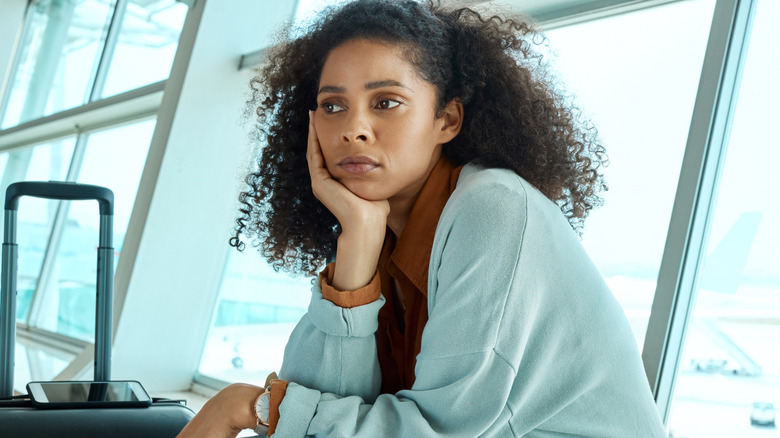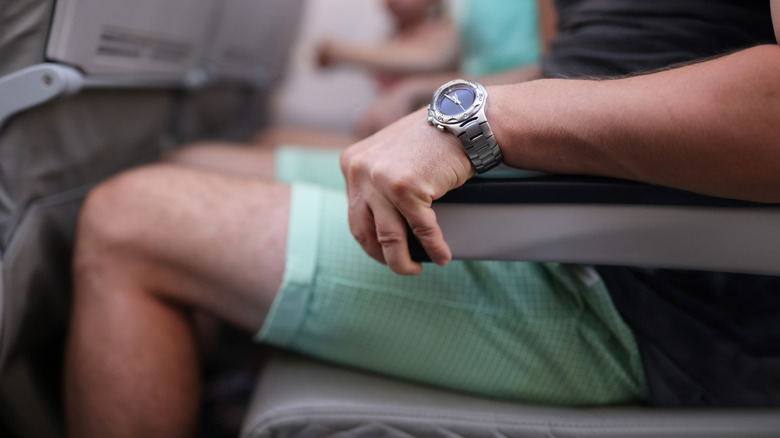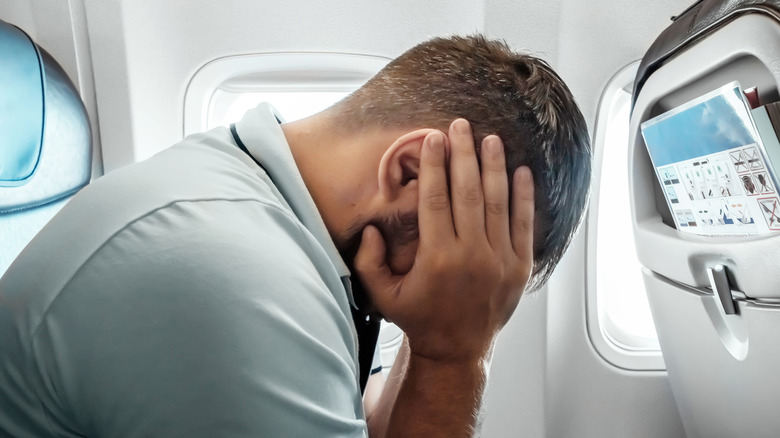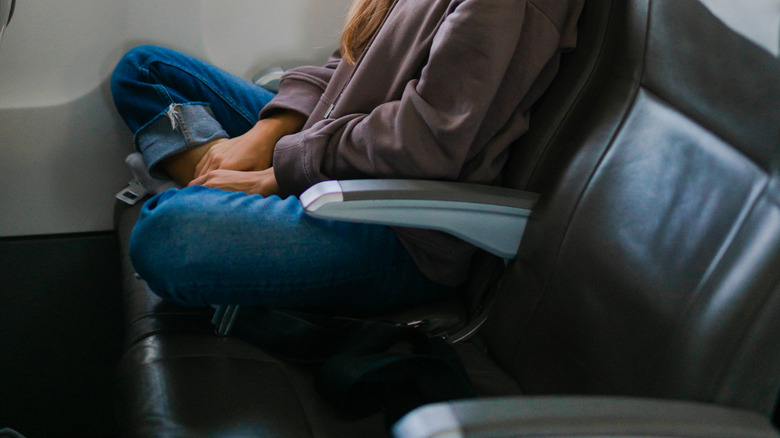Nervous About Flying? Here's What An Expert Recommends To Feel Safe In The Air
A certain degree of nervousness around traveling is not at all unusual. Many travelers have had to work to stay calm in crowded airports. For some of us, though, the fear of flying is severe enough to make traveling a lot more unpleasant. From nausea, sweating, and fidgeting to full-blown panic attacks and obsessive thoughts about something going wrong during the flight, the fear can be crippling. To find out what people can do to overcome these fears or at least manage their anxiety enough to get through the flight, Islands spoke to licensed psychologist Dr. Menije of Woodland Hills Therapy.
Before we can talk about how to handle your fear of flying, it's important to understand where this anxiety comes from. Dr. Menije explained: "This anxiety stems from not being in control. For example, when someone is driving, they may be at risk of getting into a car accident, but this typically doesn't show up because they feel 'in control' behind the wheel, whereas when in an airplane, there is a complete loss of control, which tends to exacerbate the anxiety."
Recognizing rumination and feelings of anxiety
If you haven't flown very many times before or hit scary turbulence mid-flight, it makes sense that you might feel a little nervous. However, if you're not able to stop worrying about safety issues to the point that it's making it hard for you to get through the flight, you may be ruminating on those fears. Dr. Menije stated: "The most common reason behind fear of flying is fear of danger and concerns around safety. Most often, when people experience anxiety around flying, it is coupled with thoughts about 'what if something bad happens?'"
While many people may have passing thoughts about risks or momentary concerns about safety in the air, ruminating on those thoughts can make airplane anxiety a lot worse. If you're afraid of flying you probably know it — and you may have found ways to manage it, like booking flights when there's less likely to be turbulence or wearing noise-canceling headphones to soothe plane anxiety. However, just knowing that you're afraid of flying is different from recognizing anxious thoughts for what they are. Naming those anxious feelings can be the first step to figuring out how to manage them.
Try to reframe anxious thoughts about flying
While that's definitely easier said than done, once you catch yourself having spiraling negative thoughts about your safety on the plane you can try to work on them. While it's not a quick fix, challenging those thoughts as they come can help to keep you from getting trapped in the anxiety. According to Dr. Menije, in addition to trying to stop the rumination while you're on the plane, you should start pushing back against anxious thoughts before takeoff, too.
"By naming your anxious thoughts, e.g., 'What if the plane crashes' or 'What if I am stuck in the terminal for hours,' you can learn to identify the all-or-nothing thinking and/or catastrophic patterns in your thoughts and engage in thought-reframing so that you have a more realistic and balanced perspective," Dr. Menije told Islands. "When our thoughts are changed and reframed, they ultimately lead to a decrease in anxiety."
Try to ground yourself in the sky
If you're sitting in your seat on the plane and start feeling your chest tightening and panic rising, you might want to try some grounding techniques. Dr. Menije particularly recommends trying the "5-4-3-2-1 method." She explained: "It involves identifying 5 things you can see, 4 things you can feel, 3 things you can hear, 2 things you can smell, and 1 thing you can taste."
This strategy does more than just distract you — though that can help, too. It can help you regulate your emotions, activate your parasympathetic nervous system, and help bring you out of the what-ifs and into what's actually happening. Dr. Menije also suggested trying some deep breathing techniques to help keep you from feeling like you're drowning in the floods of anxiety you might feel when you step onto a plane. These don't have to be complex — for some, just breathing in through the nose for a count of five and out from the mouth for five can help reduce anxiety.
Consider working with a professional to overcome flight anxiety
Anxiety can be debilitating, and having a serious fear of flying can keep you from traveling and exploring the world. Dr. Menije said: "Anxiety has a way of taking over the wheel...and creates avoidance and limitations. You notice that your anxiety has taken over your life when all of your decisions are based on your anxiety levels rather than your values and desires."
If you're starting to feel like your fear of flying is limiting your life and keeping you from achieving your goals, it is time to talk to a professional. A therapist may help you visualize being on the plan and challenge your fears in a safe environment, practice mindfulness, identify distortions in your anxious thoughts, and work to make travel a more pleasant experience. Dr. Menije assured us: "Working with a licensed therapist who specializes in anxiety will benefit anyone with a fear of flying so that you learn the right coping skills and take back the power... You will learn how to manage your emotions so that they are not running your life."




